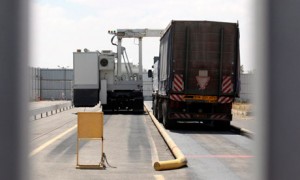
Israel today lifted its ban on most consumer goods entering Gaza, but maintained its limits on many building materials, which it said could be used to manufacture weapons.
The authorities published details of items that will still be proscribed. The “lists of controlled entry items” covers arms, munitions and “dual use” items that could be used in the development and production of “military capabilities and terrorist capacities”. The latter includes chemicals, ball bearings, lathes, optical equipment and navigation aides.
The new list of banned goods was published on the eve of Israeli prime minister Binyamin Netanyahu’s visit to the White House. President Barack Obama has been pressing Israel to ease the blockade of Gaza after its deadly assault on the flotilla of ships carrying aid to the besieged territory.
It has taken Israel more than two weeks to publish the list after the announcement of a new policy on Gaza brokered by Tony Blair, the Middle East envoy.
Part of that agreement was to reverse the arrangement where Israel maintained a list of goods that could enter Gaza while everything else banned. From now on, all items not on Israel’s prohibited list will be allowed through the crossings.
The list published today also specifies building materials for projects authorised by the Palestinian Authority and implemented by the international community.
Aid agencies are sceptical about whether the new policy will substantially improve living conditions for most Gazans. Almost all consumer items have been available in Gaza’s shops and markets throughout the blockade thanks to the underground tunnels between the southern end of the territory and Egypt.
But the continued exclusion of building materials for general use means the desperatelyneeded reconstruction of homes, schools and businesses damaged or destroyed in Israel’s war on Gaza in 2008-09 will be delayed further.
There were no details in the announcement regarding the import of raw materials which Gazan economists say are essential to allow crippled businesses to recover. Exports, also critical to the Gazan economy, were not mentioned.
Blair welcomed the Israeli move as a “significant milestone” but said the real test would be its implementation. “Thousands of items that have not been available through legitimate channels for the last three years should now enter as a matter of course,” he added. “This will produce a counterweight to the tunnel economy, which has been under Hamas control.”
Oxfam welcomed the decision as a “step in the right direction”. But it said that allowing exports to leave the Gaza strip was just as important to help Gazans rebuild their economy. It said the blockade had to be “fully lifted to enable Palestinians to engage in productive, dignified work. That would help restore hope in the future for Gazans and it would be an important step on the road to peace.”
But Sami Abu Zuhri, a Hamas spokesman, said Israel’s new policy was worthless. “The problem is not to approve new merchandise, but to lift the blockade,” he told Associated Press. Guardian

Leave a Reply
You must be logged in to post a comment.